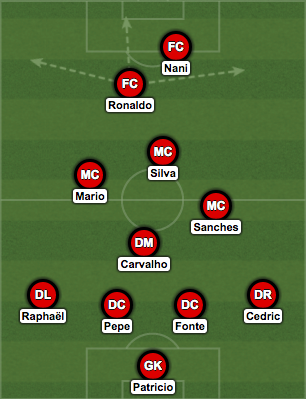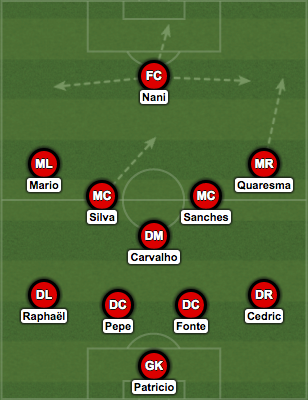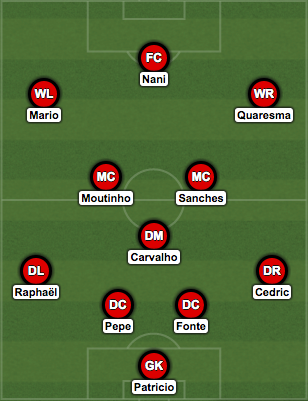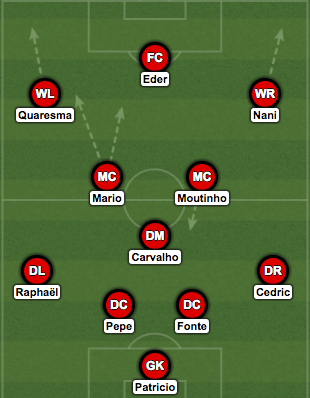Going into the 51st European match of the summer, the result seemed clear. France had the talent, the history, and even coincidence on their side. They had been the best team in the competition, had won both previous tournaments held at home, and had an uncanny knack of winning the Euros every 16 years, dating back to their inaugural win in 1984. Portugal’s presence in the final meant that they had already equaled their best ever record at the Euros. They should not have had a chance, and yet they ended the night as victors. Stunningly, they even managed to do so without Cristiano Ronaldo on the pitch. Central to this upset were the tactics of Fernando Santos, the Portuguese manager.
Santos came into the tournament as a relative unknown compared to some of his contemporaries in charge of major countries. While Germany had Low, France had Deschamps, Italy had Conte, Spain had Del Bosque and England had Hodgson, Portugal had an electrical engineer whose last trophy had been the Greek Football Cup in 2002. Portugal’s performances in the group stage of Euro 2016 did nothing to dispel the idea of a man out of his depth. Lacklustre draws against Iceland and Austria were followed up by a pulsating 3-3 draw with Hungary, a match of the tournament contender. However, even this match was seen as a damnation on Santos’ tactics, as he was blamed for Portugal’s porous defence as Ronaldo gained the plaudits for helping his country squeak into the knockout stage via third place.
Going into the knockout stage Portugal were predicted to lose out to Croatia, whose highly talented midfield had orchestrated a win over reigning champions Spain. However, a tactically stifling match was finally decided towards the end of extra time, as Quaresma knocked in a rebound from a Ronaldo shot. In similar fashion, Portugal defeated Poland on penalties in their quarterfinal, as 18-year old Renato Sanches took the plaudits for his all action performance and late equalising goal.
Thus, going into their semifinal against a Wales side that had knocked out the highly fancied Belgians, Portugal had yet to win a match in normal time. With Pepe and William Carvalho out, through injury and suspension respectively, Santos’ Portugal were predicted to struggle against a confident Welsh side led by Gareth Bale. Instead, Portugal comfortably defeated them as Santos’ tactics were finally given the credit they were due. His floating two-man attack had picked apart the Welsh defence, while the entire team continued to maintain their foundational defensive stability.
For the final against France, Sanches decided to continue relying on his supremely organized defence, with the added bonus of the returns of Pepe and Carvalho. He sent them out lined up in a 4-4-2 diamond, with Carvalho at the base and Adrien Silva at the tip of midfield. Up top, Nani was to move like a central striker while Ronaldo was given free reign while attacking. While France started as the brighter side, it is unknown how effective Santos’ formation would prove against the host as Portugal lost their captain and talisman quite early in the game. After an earlier knock as a result of a clash with Dmitri Payet, Ronaldo was finally stretchered off the pitch in tears in the 23rd minute. With their only world-class player forcibly off the pitch, the result looked like a foregone conclusion. However, this failed to account for the determination of Nani and the tactical brilliance of Santos.
In the first 20 minutes, through a combination of talent and atmosphere, France had been able to unsettle the Portuguese defence and midfield. Thus, they had been able to take control of the match as multiple Iberian players made sloppy mistakes. In order to regain their defensive composure, Santos put on Quaresma for the injured captain, shifting Portugal’s shape from a 4-4-2 to a 4-5-1. With Joao Mario and Quaresma acting as wide outlets in support of target man Nani, the new three-man Portuguese central midfield were able to suffocate the flow of France’s play. Crucial to this change was Nani’s psychological role. Taking the armband from Ronaldo, he finally stepped out of the shadow of his ex-Manchester United teammate to spur on his country. His unrelenting movement and tenacity gave the Portuguese team a motivational boost, as they fought back to wrest dominance of the game by the end of the first half.
As the second half started, a pattern began to emerge. When Portugal had the ball, they played with a form of intentional self-imposed sterile domination. They did not want to leave themselves open to the counter, especially against Sissoko who had a great game going forward. Additionally, they were happy to defend deep when they did not have the ball, as France often resorted to futile crosses that Pepe and Fonte were happy to clear. However, once Coman was brought on an hour into the match, he changed the dynamic as he was willing and able to take on and beat Portuguese defenders. In order to relieve the pressure on his defence, and keep the French midfield of Pogba and Matuidi pinned to the halfway line, Santos brought on Moutinho for Silva in the 66th minute. This shifted Portugal’s formation from a 4-5-1 to a counterattacking 4-3-3, with Quaresma and Mario pushing forward to help Nani keep the French defense on their toes.
This change had the effect of creating a tactical stalemate in the middle of the park. While the French continued to occasionally look threatening when Sissoko or Coman were on the ball, they looked tired. Whether this was because they had done most of the running in the first half, because they had one less day of rest, or a combination of the two, this gave Portugal breathing space. However, because of both Nani’s lack of heading ability and their fear of conceding a goal on the counter, the Portuguese never committed enough men forward to breakthrough the French defenses. However, as the game was coming to an end, Santos made an interesting change. Brought on in the 78th minute, alongside France’s substation of Gignac for Giroud, Eder replaced Sanches.
While the formation remained the same, it affected Portugal’s play drastically. Quaresma and Nani, the new wingers, finally had a good, if not prolific, target man to aim for. In the middle, Moutinho was pushed back to replace Sanches as Mario replaced Silva at the head of midfield. While this had the intended impact of sharpening Portugal’s attack, it also created a vacuum in midfield. Moutinho, while a fine playmaker, does not have the ability of reading the game like Sanches. As such, the Portuguese midfield had become slightly more porous, and France began to see more of the ball. Presumably, Santos understood the risks of his change, and in effect was willing to bet that Portugal’s tenacity and France’s tiredness would be enough to offset the new gaps in midfield. It was a gamble he nearly lost, as Gignac danced his way through defenders and hit the post deep into stoppage time. Had the French striker put his shot on target, the host nation would have undoubtedly maintained their perfect tournament record on the night.
Extra time would see the continuation of the same tactical battle, but tilted in favour of Santos. His gamble had come off, as the French side started to tire and fade, unable to exploit Sanches’ absence in the Portuguese midfield. Additionally, Eder seemed to be growing in the game as he continued to hold up play and bring in other players on the counter. He even managed to plant a header towards goal from a corner in 104th minute, but it was duly saved by the impeccable Hugo Lloris. However, as the game continued on in the second half of extra time, it looked like we were headed for penalties. France were far too tired to take the game by the scruff of the neck, while Portugal didn’t look to have the quality to breakthrough an immensely talented French defence.
However, no one had said anything to Eder. Getting the ball a few yards outside the box, he tried looking for a tired teammate who had decided to make a run. Finding no help, he noticed that Koscielny had failed to close him down. Undoubtedly believing that Eder would not have the ability to strike the ball from that far out, the French defender had been lazy about his responsibilities. Eder took no notice of his reputation or history, and firmly struck the ball into far right corner of Lloris’ goal. The striker with no previous goals for his country, who had been released by Swansea after 6 months for being ineffectual, had struck a goal so brilliant that Cristiano Ronaldo himself would’ve been proud of it. Understandably, an already tired France were deflated by the goal, and thirteen fairly calm minutes later, Santos had led Portugal to their first international trophy.
While his substitutions and in-game changes were rightly lauded, Santos’ off-field work is also commendable. The Portuguese players used three different formations in this match alone, not to mention their slight alterations against Wales, and not once looked uncomfortable with their duties. This points to an established training method and absolute trust in the coach, a hard feat to achieve when considering the quality of managers many of the players had worked under.
Where Carlos Quieroz and Luiz Felipe Scolari had failed, Santos had succeeded. Impressively, this win meant that Portugal had maintained their unbeaten record under the engineer, a run stretching back two years. The telecommunications engineering graduate had created a connection in his team that nothing could interrupt. For the first time in recent history, Portugal were no longer reliant on Ronaldo but rather on themselves. This willingness to fight for each other has catapulted Fernando Santos into the stratosphere of European management.
With the young talent bursting through Portuguese ranks right now, it will be a surprise if they do not do well in Russia in 2018. It would probably be Ronaldo’s last tournament but, as Santos has shown, that doesn’t mean it would be the end of Portuguese ambitions.
Source: SixthFeb




